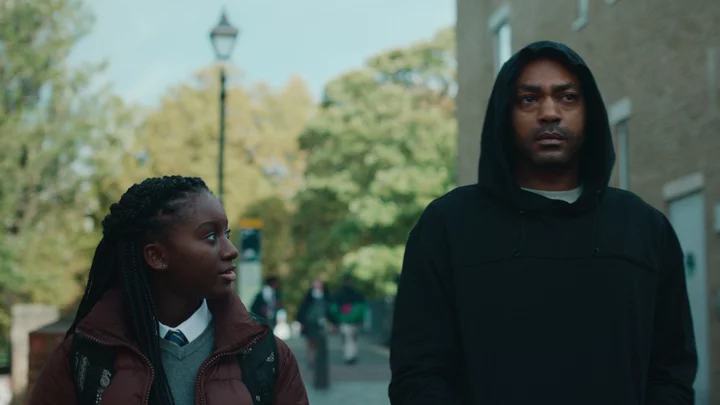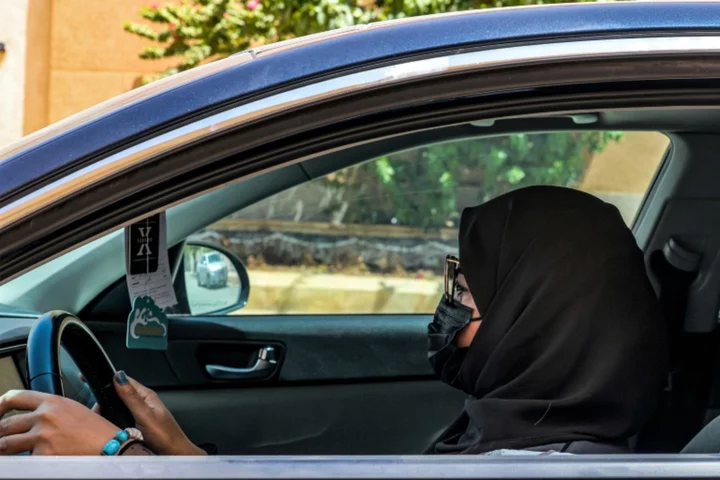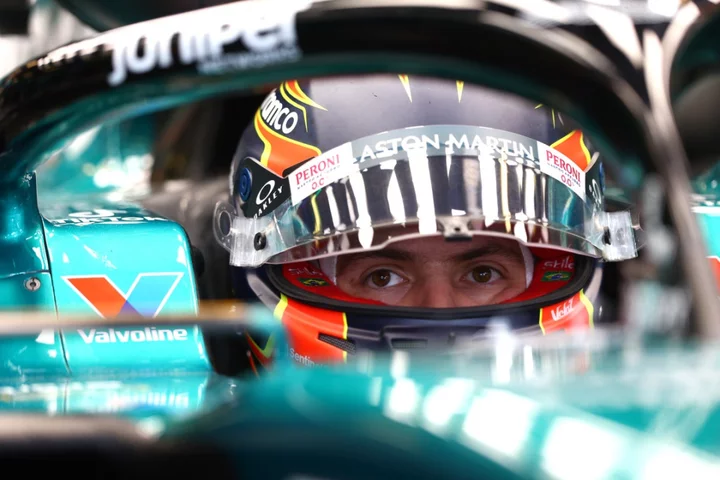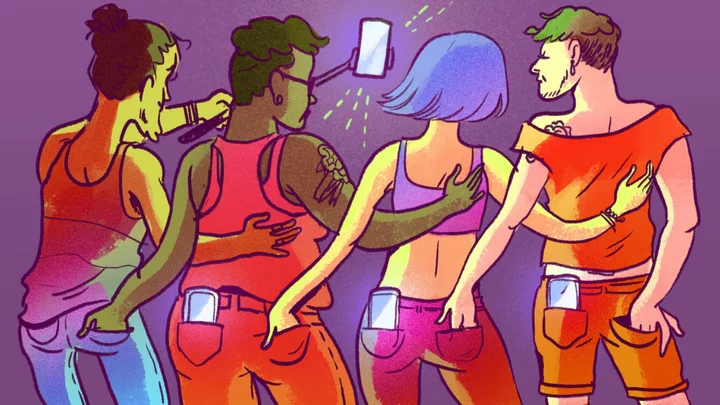Since 2011, Top Boy has given a voice to the silenced as it explores the people behind the stereotypes. Creator Ronan Bennett's characters aim to educate viewers on the situations that have led young people, particularly Black British men, to be labelled as drug dealers and criminals, as it simultaneously touches on topics at the heart of communities, such as mental health, abuse, immigration, and violence. The show portrays how individuals with a desire to financially help their families and live a better life have been persuaded into the idea of becoming a top boy.
Across its five seasons, the show has given an insight into the lives on council estates as it centred itself around friends and drug leaders Dushane (Ashley Walters) and Sully (Kane Robinson) and their battle for supremacy, a path which becomes violent and increasingly isolated.
Providing is everything in Top Boy
One of Top Boy's core sources of tension is the questioning of morality that scrutinises the idea of choices being 'good' or 'bad', as character decisions are more often than not made from a place of genuinely believing it's the right thing to do for themselves and those who depend on them.
SEE ALSO: 'Top Boy' Season 5 review: The powerful end this masterpiece of a series deservesThe show explores this is by examining how poor and marginalised communities are treated by society, especially the idea that partaking in criminal behaviour is the only way you're not going to live hand to mouth. We see this in Season 3 with Ats (Keiyon Cook), who transforms from a fun, social student to a withdrawn, serious drug runner as he tries to provide for his mother who is no longer entitled to work, due to the Home Office threatening to deport her.
The need to provide for loved ones is a central motivation for almost every character in the show. Before Jamie’s death at the end of Season 4, Michael Ward portrays him as a tough guy to the outside world, the unshakeable new leader to be reckoned with, while simultaneously being a vulnerable parental figure to his two younger brothers, Stefan (Araloyin Oshunremi) and Aaron (Hope Ikpoku Jnr), in their parents' absence. Jamie's entire reason for selling drugs is to provide for his family and to protect them at all costs, urging them toward education and university, and reinforcing the idea to them that his work is a means to an end.
Aaron (Hope Ikpoku Jnr), Stefan (Araloyin Oshunremi), and Jamie (Michael Ward) in Season 4. Credit: NetflixUltimately, Jamie's close relationship with his brothers becomes an effective way for Dushane and Sully to gain power over him; in one of his most vulnerable moments in Season 3, Jamie breaks down on a bench after Aaron is arrested for firearm possession, framed by Dushane. Despite trying to protect his brothers from going down the same path as him, Jamie’s death sees his brother Stefan tempted to enter this life of crime in Season 5, fuelled by getting revenge on his brother's murderer, Sully, while struggling to process his grief.
"There's always a way out if you come from money"
It’s not the default for these characters to aspire to selling drugs, but they take advantage of the opportunities presented to them on the Summerhouse estate — to them, there's a strong possibility that a regular job would never provide enough money for their families to survive. This is explored through the character of Becks (Adwoa Aboah) in Season 5, as she tries to convince her partner Jaq (Jasmine Jobson) to leave the business, that despite her limited experience beyond selling drugs, she can simply walk away. "There's always a way out if you come from money," Jaq replies. Top Boy continually reminds us that while poverty is not justification for the violence that ensues, systemic oppression means that people take the opportunities they are confronted with and for the lower classes that is often within the life of crime.
Dris (Shone Romulus) and Dushane (Ashley Walters) in Season 3. Credit: Chris Harris/NetflixBeing financially stable and providing for their children is one of the reasons Sully and Dris (Shone Romolus) get into dealing drugs in the first place. When this business isn’t fulfilling its purpose as planned, characters like Dris are led to do desperate things to get more money in their pocket. The pressure of providing for his family overrides any logic Dris holds and in the end, it leaves his daughter Erin (Savanah Graham) fatherless.
Characters live with such heavy pressures of providing that they make rash decisions in Top Boy. In Season 5, Jaq feels her mission to provide for and protect her sister Lauryn (Saffron Hocking) has failed after her tragic death, and she decides to steal Sully's resources to inhibit future harm on families including her newborn nephew. Dushane also feels he has failed his partner Shelley (Simbi Ajikawo aka Little Simz) when his entire fortune goes missing along with drug lord Lizzie (Lisa Dwan). Having promised Shelley startup funds to start her chain of nail salons, then being found wanting, Dushane's inability to financially provide sees him panic and snap violently toward his girlfriend.
Violence and mental health in Top Boy
Top Boy has long used the violence synonymous with selling drugs as a way to explore mental health within its main characters.
In Season 1, Ra'Nell's mum Lisa (Sharon Duncan-Brewster), requires inpatient treatment for depression after enduring abuse from Ra'Nell's father. The result of this causes young Ra'Nell (Malcolm Kamulete) is adultify as he’s forced to live alone. It sees him becoming susceptible to getting involved with drugs through his neighbour Heather (Kierston Wareing), who, in turn, is doing so to provide a future for her unborn child.
The storylines which explore young men like Ra’Nell and Ats being forced to adultify to look after their mothers and those around them shows how socioeconomic disadvantage — including unemployment and housing unaffordability, both which have been correlated with a risk of mental illness — sees young people becoming trapped in a cycle of illegal activity to provide for themselves and their families, despite trying to avoid it. It's a similar plight to Jason (Ricky Smarts) in Season 3, who becomes a parent to his mother, following her battle with addiction and healing from domestic abuse.
SEE ALSO: ‘Top Boy’ Season 5 confirms women have always been the starsTop Boy's lead characters seek relationships, romances and friendships, beyond their daily experiences with violence and dealing; we see it in Shelley and Dushane, Jaq and Becks, Stef and Erin.
In Season 3, Sully and Jason find the family they never had in each other and manage to forge a genuine bond. Jason's been desensitised to violence through his home experiences, allowing him to connect with Sully. So, Jason's death after a racially motivated attack causes Sully immense pain and what could be perceived as post traumatic stress disorder, which is never resolved or treated and manifests until he’s barely recognisable from the man he was in Season 1. The fire plagues him through sensory hallucinations of fire and marks a shifting point in his character as he becomes hyper-aware of perceived threats and reacts badly to them as shown by how he deals with powerful newcomers like Jamie in Season 4 and Johnny McGee (Barry Keoghan) in Season 5.
Sully (Kane Robinson) in Season 5. Credit: Ali Painter/NetflixThe idea that no one is exempt from experiencing mental health problems is also depicted in the show with Dushane, who further links being a top boy to anxiety disorders. In Season 4, Dushane begins to suffer from panic attacks, which he is initially confused by because it doesn't align with what he knows of his lifestyle. "You ever get this ting where your heart’s pounding for no reason and that?" he asks Sully.
Anxiety becomes an aspect of Dushane's life he tries to keep concealed until he can’t, seeing him physically collapse after finding out about the death of his mother. Dushane's fixation on power and wealth destroys his relationships with Shelley and Sully, as he increasingly acts erratically, and he forgets his initial ambition just to have a better life, leaving him alone at the end of Season 5 — "I've got no one to say goodbye to," he says.
Dushane (Ashley Walters) in Season 4. Credit: Chris Harris/NetflixMental health conversations don't really happen in Top Boy
For the most part, Top Boy’s characters fail to speak to each other about mental health beyond superficial levels, which plays into the social constructs of Black masculinity and the tendency to suppress personal problems, as well as the link between socioeconomic inequality and poor mental health. The physical and mental ramifications of Dris' stroke just before Season 3 see him forced to take a step back from the road, where he makes little attempt to address his struggles aloud. This lack of conversation around mental health seen in the show forces the characters to deal with the aftermath of their traumas alone.
Likewise, Jaq’s inability to see outside her lifestyle affects her ability to really hear her sister Lauryn's struggles. Family has long been central to her character as she tells Lauryn she “always” has time for her, but the violence, coldness, and fearlessness selling drugs on the street requires of Jaq inhibits her ability to understand the need to talk about feelings, even when Lauryn is suffering from postpartum depression and recovering from domestic abuse. “I get it. I do, but I’mma be real with you, Lauryn. I ain’t really tryna hear all that," Jaq says.
Lauryn (Saffron Hocking) in Season 4. Credit: Chris Harris/NetflixWhat started as a way for these characters to ensure financial stability for their loved ones ends in tatters. The cost of providing sees Dushane, Sully, and Jaq lose themselves and others until very little is left. Dushane loses his relationship with Shelley and then his life. Jaq loses her sister Lauryn, her best friend Kieron (Joshua Blisset), and almost her own life. Sully loses his life and fails to embody the heroic father ideal of himself he wanted for his daughter which he spoke about in Season 3: “When her daddy comes home, that little girl needs to be standing in front of a hero. Not a fucking con in prison stink.”
The lack of effective mental health support provided to those in lower socioeconomic communities because of economic and social barriers has drastic effects as depicted in the show's final scenes when Sully is finally confronted by Stefan. Sully reveals that “feelin' done left me a long time ago" confirming how much he’s changed since Season 1; Sully initially hesitates before killing people at the beginning of the show, but in the final season he makes every kill — even that of his long-time friend — without hesitation. Sully's lifestyle has required so much from him that he’s numb to any harm he causes himself or others.
Top Boy ends by cementing how a decision to enter a life of crime to provide for your loved ones has dramatic implications beyond the overt legal ones. It often sees those same people suffering from mental health issues with no support. Top Boy connects the link between real stories of everyday people and provides truly compelling entertainment as it doesn’t glorify the lifestyle but instead reflects on the cost made by those in it.









